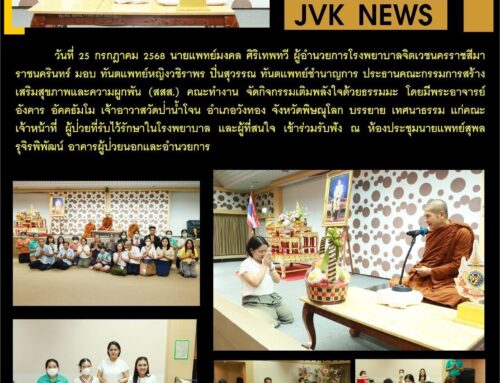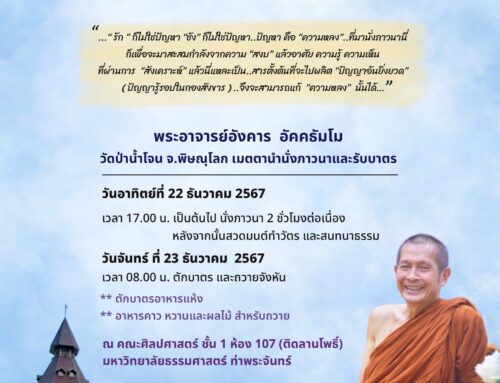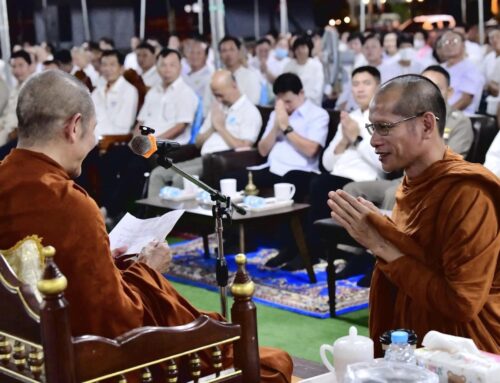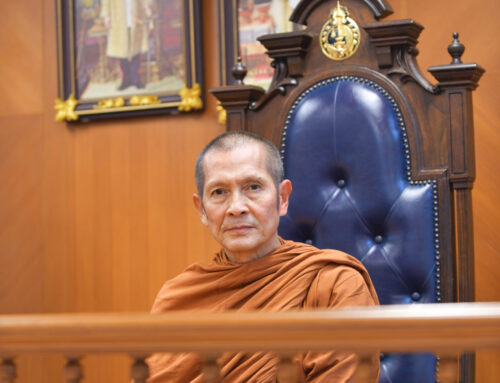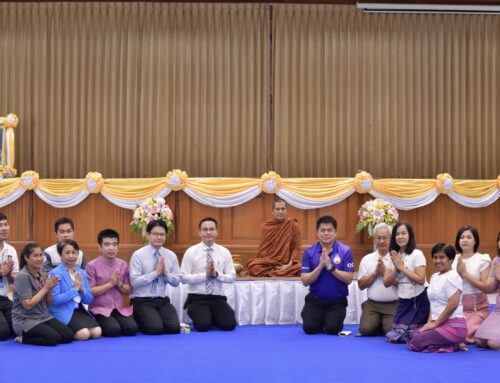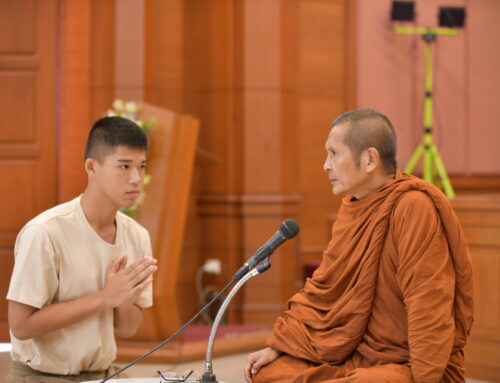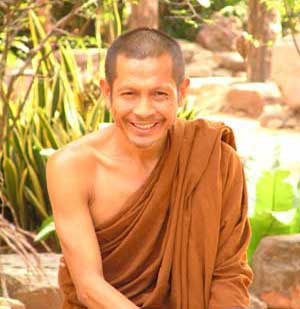
“… ก็เพราะพวกเรางานยุ่ง เพราะพวกเรามันสมองดีเลิศจึงคิดแต่จะส่งจิตออกนอกจนเลยเขตเลยแดนนั่นแหล่ะ มันจึงทำให้พวกเราต่างคนต่างเครียด ซึ่งหากว่าไม่มีความยับยั้งชั่งใจแล้วล่ะก็ อย่างน้อยๆก็ทำให้ตัวเองหงุดหงิด มากกว่านั้นก็เกิดการกระทบกระทั่งกันระหว่างคนรอบข้างทั้งเพื่อนร่วมงาน เพื่อนบ้าน ผัวเมีย ญาติพี่น้อง หมูหมากาไก่ หรือแม้กระทั่งบางครั้งข้าวของเครื่องใช้ก็ยังพลอยโดนหางเลขเข้าไปด้วย… ที่พระพุทธเจ้าทรงบอกไว้ให้มาดูลมหายใจเข้า-ออกนั้นก็เพื่อจะให้พวกเราได้รู้จักกับตัวตนที่แท้จริงของพวกเรา ตัวที่จะนำสุขนำทุกข์มาสู่พวกเราทั้งชาตินี้และชาติหน้าตราบเท่าที่พวกเรายังมีความสำคัญมั่นหมายอยู่กับสรรพสิ่งนั่นแหล่ะ … “ จิต” คำเดียวสั้นๆ มันคือ “ผู้รู้” มันเป็นนามธรรม มันเป็นธาตุรู้ มันจะต้องออกรู้จะให้มันอยู่เฉยๆ ลอยๆ ไม่ได้หรอกในเบื้องต้น เนื่องจากการรู้ของมันยังไม่มีวุฒิภาวะพอ เหมือนเด็กเล็กๆที่คอยสร้างความปวดเศียรเวียนเกล้าให้กับพ่อแม่นั่นแหล่ะ… เดี๋ยวก็เรื่องนั้นเดี๋ยวก็เรื่องนี้.. จนกว่าเขาจะเล่นจนเหนื่อยแล้วก็หลับไปเองนั่นล่ะ พ่อกับแม่ถึงจะพอได้หายใจ หายคอ โล่งสะดวกขึ้นบ้าง..ฉันใดก็ฉันนั้น..จิตก็เหมือนกันเราจึงต้องหาเครื่องอยู่หรือของเล่นให้มันเล่น อย่างเช่นให้มันรู้อยู่ หรือเล่นอยู่กับลมหายใจเข้า ลมหายใจออก หรือเพิ่มคำบริกรรมเข้าไปด้วยก็ได้เช่น หายใจเข้าก็พุท หายใจออกก็โธ โดยอาศัย “สติ” คือความระลึกได้ “สัมปชัญญะ” ความรู้ตัวเป็นพ่อเป็นแม่ช่วยกันประคับประคองคอยกำกับ ดูแลลมหายใจมันกระทบที่ไหนชัดเจนก็ให้สติคือ ความระลึกได้กำหนดดูอยู่ที่นั่นมันจะแว้บหนีจากลมหายใจ จากคำบริกรรมไปเที่ยวที่ไหน ก็ให้สัมปชัญญะความรู้ตัว พยายามรู้ให้เท่าทันแล้วดึงมันมาแว้บไปก็ดึงมา…แว้บไปก็ดึงมา…ทำอยู่อย่างนั้นแหล่ะเหมือนเล่น“ชักเย่อ” กันเดี๋ยวก็พุท..โธ ..ๆๆ เดี๋ยวมันก็แว้บไป เรื่องการเรื่องงาน เรื่องบ้านเรื่องช่อง เรื่องรักเรื่องชัง เรื่องดีเรื่องชั่ว เดี๋ยวก็อดีตเดี๋ยวก็อนาคต เราก็พยายามดึงให้มันมาอยู่กับปัจจุบัน คือ หายใจเข้าก็พุท..หายใจออกก็โธ..เอาอยู่อย่างนี้แหล่ะ วันละ 5 นาที 10 นาที ก็ยังดีใครอินทรีย์แก่กล้ามีเวลามากก็ทำให้มาก เจริญให้มาก ทำจนจิตมันสงบเยือกเย็นจนเป็นสมาธิได้ ก็ยิ่งจะเป็นบุญเป็นกุศลอันมหาศาลแก่ตัวเอง แต่ถึงแม้นว่า มันยังไม่สงบลึกจนเป็นสมาธิอะไรก็ตามก็ไม่ต้องน้อยอกน้อยใจอะไร อันจะเป็นการไปเพิ่มความเครียดให้กับตัวเองเปล่าๆ ก็ต้องหัดคิดให้เป็นไปในทางบวกบ้างว่า..ช่างมันเถอะอย่างน้อยๆเราก็ไม่ได้ไปสร้างบาปสร้างเวรอะไรกับใคร อย่างน้อยมันจะต้องสงบอารมณ์บ้างล่ะ (ถือซะว่าได้เซฟสมองไว้ใช้งานในวันต่อไป) อย่างน้อยๆก็จะได้รู้ได้เห็นความเป็นไปของจิตบ้างล่ะ (เดี๋ยวก็โดดไปคว้าเรื่องนั้นจับเรื่องนี้อยู่ตลอดเวลา) หรืออย่างน้อยๆ ก็จะต้องรู้จักการยับยั้งชั่งใจ รู้จักการผิดหวังบ้างล่ะ (คือเคยคิดเคยปล่อยอารมณ์ตามสบายเรื่อยเฉื่อยตลอดมาแต่พอเวลานั่งภาวนากลับต้องถูกเบรคอารมณ์ ถูกเบรคความคิดไงล่ะ)
…โดยปกติคนเรานั้นจะชอบทำอะไรตามใจตัวเองอยู่แล้ว อยากคิดก็คิด อยากทำอะไรก็ทำ แต่ปานนั้นก็ยังบ่นว่าทุกข์ว่าไม่สบาย ว่าไม่ได้ดั่งใจเลย ในเมื่อมันเป็นเช่นนั้น พวกเราก็มาลองทำตามพระพุทธเจ้าดูบ้าง จากน้อยไปหามาก วันละ 5 นาที 10 นาที ก็ไม่น่าจะทำให้อะไรเสียหาย นอกจากกิเลสมันจะเสียความรู้สึกบ้างที่เราไปแข็งข้อกับมัน เพราะในขณะที่เราฝึกปฏิบัติจิตนั้น เราจะต้องฝืนความคิด ความเห็นเดิมๆของเราหมด อยากคิดเรื่องนั้นเรื่องนี้ก็ไม่ให้ไปคิดไปปรุง ดึงให้มาอยู่กับลมหายใจนี่ซะ หายใจเข้าก็พุท หายใจออกก็โธ พุท..โธ..ๆๆ ..อยากจะลุกจะเดินจะนอนจะไปเที่ยวนั่นเที่ยวนี่อะไรต่างๆเหล่านี้ เราก็ต้องฝืนต้องใช้ขันติ ความอดทนอดกลั้นเอา มันไม่ตายหรอก ทำบ่อย ๆ ทำให้มาก เจริญให้มาก สติสัมปชัญญะก็จะเข้มแข็งขึ้น จนรู้เท่าทันอาการของจิต จนกระทั่งสามารถควบคุมจิตได้ จิตใจก็จะเริ่มมีคุณภาพมากขึ้นเรื่อย ๆ ตามกำลังแห่งสติปัญญา เวลามีเรื่องอะไรมากระทบกระทั่งก็จะได้รู้จักหยุดพิจารณา รู้จักยับยั้งชั่งใจ รู้จักคิดบวกลบคูณหาร ถึงผลที่จะตามมาภายหลังก่อน แล้วจึงค่อยตัดสินใจพูดหรือตัดสินใจทำลงไปในทุกๆเรื่อง ถ้าจิตของพวกเราพัฒนาขึ้นเรื่อยๆ พวกเราก็จะรู้เองนั่นแหล่ะว่าในโลกนี้ไม่มีอะไรเที่ยงแท้แน่นอนหรอก ไม่มีอะไรที่จะสมบูรณ์แบบหรอก ไม่มีอะไรดีไปหมด ไม่มีอะไรชั่วไปหมดมันจะต้องคละเคล้ากันอยู่อย่างนี้ เราไม่สามารถไปกำหนดกฎเกณฑ์ให้ทุกสิ่งทุกอย่างเป็นไปได้อย่างใจเราหวังหรอก พระพุทธเจ้าท่านจึงบอกให้พวกเรารู้จักทำใจไงล่ะ…ทำใจให้มันนิ่ง ๆซะบ้างเพื่อที่จะได้รู้ได้เห็นถึงความแปรปรวนต่าง ๆ ชัดเจนขึ้น จะได้เห็นโทษเห็นคุณของความแปรปรวนเปลี่ยนแปลงกับความนิ่งนั้นว่ามันทุกข์ มันสุขต่างกันอย่างไร ถึงที่สุดก็จะได้รู้จักกับการ..ปล่อยวาง..ตามกำลังแห่งสติปัญญา ศรัทธา ความเพียรของตัวเอง .. ปล่อยวางมากก็สุขมากทุกข์น้อย….ปล่อยวางน้อยก็สุขน้อยทุกข์มาก..ทำเอาเองทั้งนั้นแหล่ะ…เอวัง…”
8 มีนาคม 2549
Tug of war of the emotion
“…As we are always busy at work and it seems that we awre so intelligent that we always protect our mind aimlessly so that we are stressful. If we do not control our mind, at least we are restless, and worse than that, we may have conflicts with people around us, such as our colleagues, neighbors, spouses, relatives, pet animals, even more, our stuffs are thrown away deliberately. That is why the Buddha taught us to note our breathing-in and breathing-out in order to know our own intrinsic nature, which will bring either happiness and suffering to us in both present life and future life as long as we still cling to all things. “Citta,” a short word, it is a knower, an abstract state, a knowing element, it have to know outside, it can’t stay without doing anything. In an early state of practice, citta always wanders to know things; it is not passive, not mature enough, comparing to a naughty boy who always annoys his parents, playing around here and there until he is tired then falls asleep that, at this time, parents will have time freely to relax.
Similarly, citta, mind is needed to provide an object for it to play with. For example, let it be with the breathing-in and-out moment, by silently reciting the word (parikamma). For example, when breathing in, silently recite the word” BUD” and when breathing out, recite the word “DHO” by applying “sati” which is mindfulness, and “sampajañña” which is an awareness sustaining the mind like parents supporting their beloved son. You have to note the breath clearly where it reaches, then apply the sati in observing the mind whenever it wanders off. When you leave out the parikamma word, then be aware of it (sampajañña) by controling the mind back to the present moment. Try to be mindful, whenever the mind is wandering, we have to control the mind back again and again just likes tug-of-war. Whenever your mind wandering to your work, family, love, hate, bad, good, to the past, and future, we must try to switch your mind back to the present moment. That is to practice the breathing- in by reciting the word “BUD” and breathing out by reciting the word “DHO” for 5 or 10 minutes a day regularly. For those who are quite skilful, having powerful faculties; still need to practice more and more until the mind is in peace and in deep concentration. It will be a great beneficial and wholesome for yourself. Although, the mind is not peaceful and not in deep concentration, do not be depressed yet as this will make you stressful and tension. You should think positively that at least you do not cause any harm to others but at least you have peaceful mind for tackling your work in the next day. At least you can see the nature of your mind which always wandering here and there. At least you have learnt how to control your mind, to know the disappointment incurred from unable to please yourself from wandering, but you have to control your emotion and thought when you meditate.
Generally, people indulge themselves to do whatever they like to do, to think whatever they want to think. But they still complain that they are suffering, they are not pleased in whatever they do. Therefore, we should do as the Buddha taught. Let us practice gradually from 5 to 10 minutes per day. It does not harm anything, except that your kilesa or defilements might not be satisfied with your rebellion. Due to the fact that, when we practice meditation, we work against the stream of thought and old perception. Don’t think aimlessly but control the thought to the present moment of breathing-in and breathing-out by reciting words of BUD….. DHO. You have to be patient and suppress yourself whenever you want to rise up, to walk, to travel here and there. Certainly, you will not die because of this.
If you practise more often, contemplate more and more, your mindfulness (sati), and awareness (sampajañña) will become powerful and enable to know your state of the mind and enable to control it. Your mind will gradually be developed to good quality according to the level of wisdom. Whenever anything bothers you, you are able to stop yourself and able to consider reasonably of the possible outcomes before saying or doing anything. If your mind constantly be developed, you will know that the world is impermanent, imperfect. Nothing is extremely bad and good but everything is a mixture of both good and bad. We cannot set everything as the way we want it to be. That is why Lord Buddha taught us to be calm and stable in order to know and to see the changes of all things clearly and the differences of suffering (dukkha) and happiness (sukkha). Finally, we will know how to let it go according to the level of wisdom, faith and endeavour of oneself. The more we let go, the more we are happy. The less you release, the less happiness and more grief you have. All I have said, you can practice and see by yourself. Evaŋ! let it be so!…”
March 8, 2006

